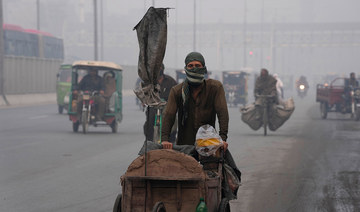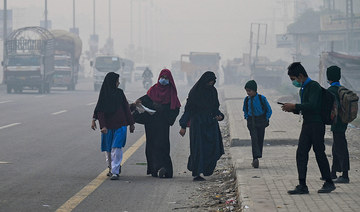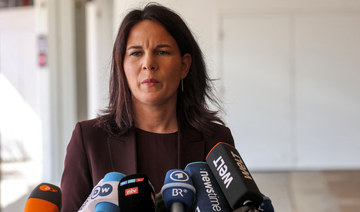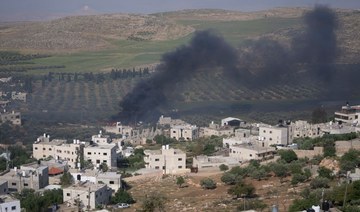ISLAMABAD: Climate change caused by increases in greenhouse gas emissions is undoubtedly the biggest challenge facing humanity in the 21st century. The failure of the international community to counter the continuing rise in global temperatures caused by these emissions could have catastrophic consequences.
As has been repeatedly stressed by UN Secretary-General Antonio Guterres, it is essential that we make peace with Mother Nature by ensuring that the average increase in global temperature remains below 1.5 degrees Celsius; the importance of this has been emphasized by scientists and environmental experts.
According to a UN report, titled “Code Red for Humanity,” which was published on Aug. 8, the earth is warming at such a rate that within about a decade temperatures could exceed the level experts warn we must avoid.
Climate change is already having devastating effects worldwide and Pakistan is among the 10 worst affected countries that have borne the brunt of this climatic onslaught in the past 20 years.
Yet many leaders around the world remain indecisive. Some of them in countries that are major polluters are reluctant to commit to cutting down on greenhouse gas emissions, preferring instead to prioritize industrial growth over environmental concerns.
As a result, developing countries such as Pakistan are having to devise their own strategies to minimize the effects of climate change until such a time that a collective global will and sense of commitment crystallizes into concrete, coordinated action to deal with the challenges.
BACKGROUND
Last year, Pakistan also co-chaired the multibillion-dollar Green Climate Fund, which was established to support climate action in developing countries.
Pakistan has also been playing a proactive role in shaping international discourse on efforts to tackle global warming.
Pakistan, under the stewardship of Prime Minister Imran Khan, has made it a top priority to implement measures that can help to reduce the debilitating effects of climate change. The central aim of these efforts is to ensure that Pakistan is a clean and green society.
A number of initiatives have been launched, including a landmark “10-Billion Tree Tsunami” reforestation project that has earned international acclaim, including praise from the World Economic Forum.
Pakistan can also rightly boast about a number of other initiatives, including its green economic stimulus, Ecosystem Protection Program, wildlife management, Protected Areas Initiative, and Clean Air Program. Khan also inaugurated the world’s biggest Miyawaki urban forest near Lahore on Aug. 9, as part of the tree tsunami.
All these efforts are, in the words of the prime minister, driven solely by his commitment to mitigating the effects of climate change and ensuring future generations inherit a clean and green Pakistan.
In addition to the previously mentioned measures, Pakistan has also launched an initiative that aims to ensure that 60 percent of the country’s energy needs are provided by renewable resources by 2030. For example, two planned coal-fueled power plants, which were intended to generate 2600 megawatts of electricity, were scrapped and replaced with hydroelectric projects.
Khan has been a vocal advocate of collective action by the international community to tackle climate change. In recognition of his comments on the issue as part of the Biodiversity Convention and in the UN General Assembly, and the nature-based solutions developed by his government, the UN Environment Program asked Pakistan to host this year’s UN Environment Day, which took place on June 5.
During the event, Khan shared his government’s plans for dealing with climate change. These include a Recharge Pakistan project, which is designed to divert flood water to wetland to recharge water tables, and the reforestation of mangroves to absorb the carbon contained in greenhouse gases.
Highlighting the threats Pakistan is facing as a result of climate change, he stressed the need for the international community to take action to reduce emissions. They are causing glaciers to melt, which threatens countries such as Pakistan and others in Central Asia whose rivers are fed by these glaciers.
He also called on the international community to assist poorer nations, including Pakistan, that are bearing the brunt of the effects of climate change.
Last year, Pakistan also co-chaired the multibillion-dollar Green Climate Fund, which was established to support climate action in developing countries. As vice president of the UN Framework Convention on Climate Change (UNFCCC) and a member of the Intergovernmental Panel on Climate Change, Pakistan has also been playing a proactive role in shaping international discourse on efforts to tackle global warming.
At this point it is worth taking a cursory look at international efforts to address climate challenges. The first international agreement to restrict greenhouse gas emissions, known as the Kyoto Protocol, was adopted on Dec. 11, 1997. It operationalized the UNFCCC by committing industrialized countries and economies in transition to limit and reduce greenhouse gas emissions in accordance with agreed individual targets in two phases.
Regrettably much of the required cooperation from participating countries failed to materialize. New Zealand and Russia participated in the first phase but did not adopt any targets during the second phase. Canada withdrew from the protocol in 2012 and the USA did not ratify it at all.
A second international accord, known as Paris Agreement, was signed on Dec. 12, 2015 during the UNFCCC’s 21st Conference of the Parties (COP). It marked a historic turning point in global climate action, as world leaders reached a consensus on its framework and goals. Regrettably, US President Donald Trump withdrew his country from the agreement while he was in office, as he did from a number of other international commitments.
It is satisfying to note that his successor, President Joe Biden, has announced his intention to rejoin the Paris Agreement. Not only that, in a reflection of the urgency with which he views climate issues, Biden also convened a Leaders Summit on Climate in April this year. The leaders of 41 countries, including Pakistan, took part.
The participants underscored the urgency, and the potential economic benefits, of stronger action on climate change. The deliberations during the event are considered to be a key milestone on the road to the 2021 UN Climate Change Conference (COP26), which will take place in November in Glasgow, Scotland.
As the people of Pakistan celebrate the country’s 74th Independence Day on Aug. 14, and remember the struggles and achievements of its founders, they can also take pride in the fact that not only are the efforts of their present-day leaders to save the nation from the effects of climate change heading in the right direction, they are also making a sterling contribution to the global climate cause.
The initiatives undertaken by Pakistan are surely worthy of emulation by the international community in general, and by other developing nations in particular.
























